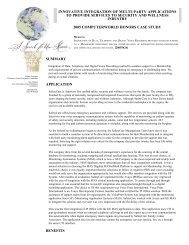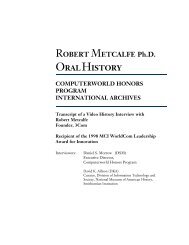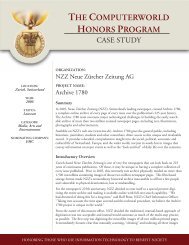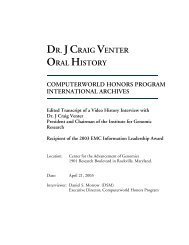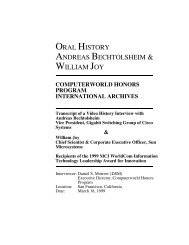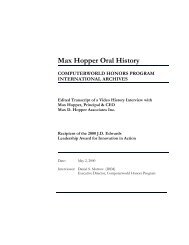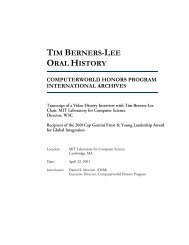NATHAN MYHRVOLD PhD ORAL HISTORY - The Computerworld ...
NATHAN MYHRVOLD PhD ORAL HISTORY - The Computerworld ...
NATHAN MYHRVOLD PhD ORAL HISTORY - The Computerworld ...
Create successful ePaper yourself
Turn your PDF publications into a flip-book with our unique Google optimized e-Paper software.
After being there for a year, I decided to take leave of absence for three months, and<br />
I never returned from my leave of absence. I intended to return, but I went to work<br />
on a software project that some friends of mine from graduate school had done, and<br />
that kept sort of snowballing. We thought we would work for a couple of months on<br />
the software project. I had never been into computers, I should mention.<br />
DA: Did they ask you whether you’d be interested in computers?<br />
NM: I was interested in computers a little bit, but I’ve never had a class in<br />
computing. I never had a class in computer science. I learned to program<br />
computers, and did a little bit of work on my thesis with computers. I typed my<br />
thesis on one of the early CPM-80 machines. It was a machine by a company called<br />
Northstar. And I used a word processor called Magic Wand, which was one of the<br />
earliest word processors. One night I had typed and typed and typed and typed,<br />
which I was terrible at. I was terrible at typing. And the machine crashed. And I<br />
hadn’t saved the stuff.<br />
This was the middle of the night, but there was a guy named Bob Austin who is still a<br />
professor at Princeton, and Bob kept bizarre hours, as I did, and I went down and<br />
talked to Bob and I talked to another friend of mine who was into computing. And<br />
he said, “Well there’s a debugger program that you might be able to use to extract, as<br />
long as you haven’t turned the machine off. You could actually go and get this<br />
debugger to boot into the machine and inspect the contents of memory. “ You can’t<br />
do that in computers any more, but on the CPM-80 machines you could. So he gave<br />
me this debugger disk, which is this eight-inch floppy monstrosity, and this<br />
mimeographed instructions for the debugger. It took me like three hours, but I<br />
figured out how to use the thing and how to recover. Of course I would have been<br />
time ahead if I’d just retyped it. But by god I was going to get that stuff out. So I<br />
got it, and I saved it off disk, and that was my first experience with a mini,<br />
microcomputer.<br />
While I was working on my thesis, a couple of friends of mine in graduate school<br />
decided that it would be great if there was a program to help us do equations on our<br />
computers --something that would let you use equations with the same facility you’d<br />
manipulate text with the word processor. At that time there was a couple of<br />
programs, something called Maxima that was done at MIT, and something called<br />
MSP that had been written by a guy Cal Tech, who was in the Institute for Advanced<br />
Study, named Stephen Wolfram. <strong>The</strong>y were computer algebra packages, but they<br />
weren’t made for little computers, they were made for big computers. <strong>The</strong>y weren’t<br />
made for casual use.<br />
Nathan Myhrvold<br />
Oral History<br />
14



